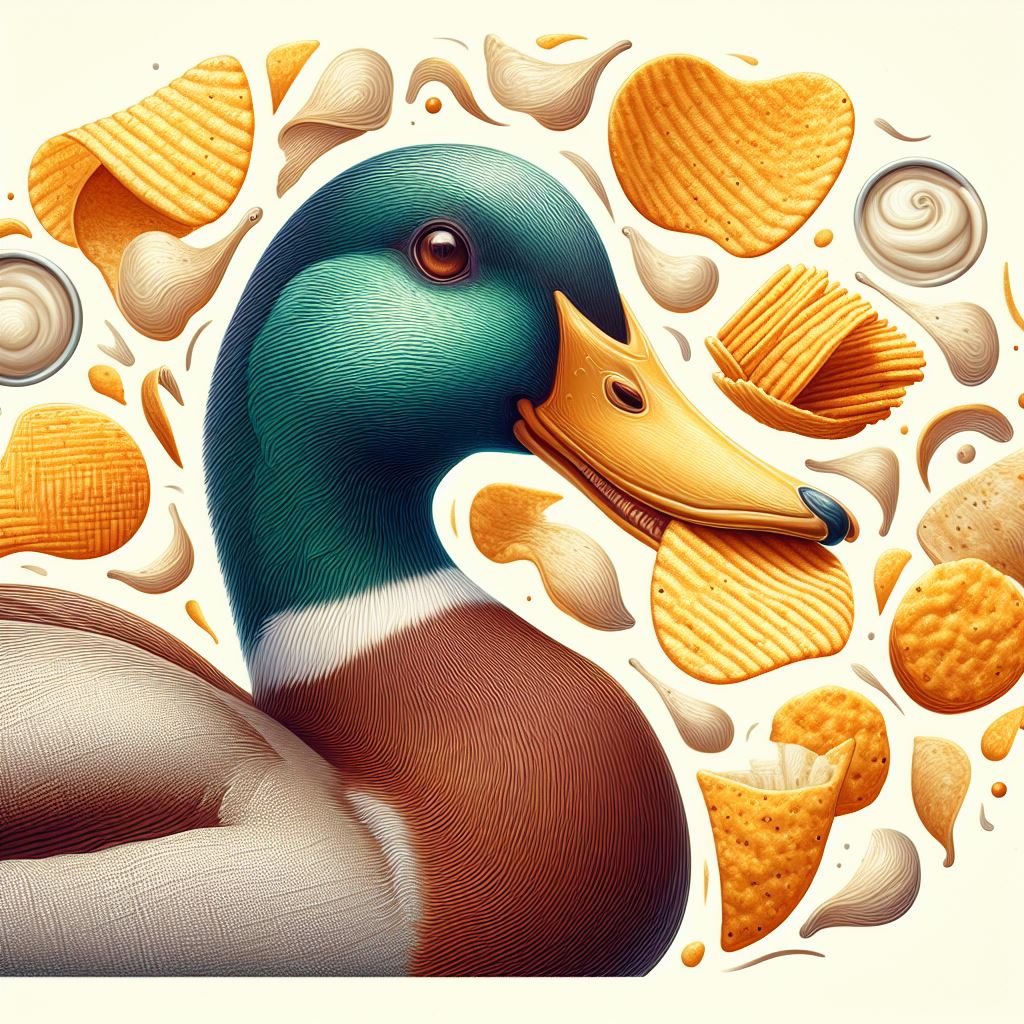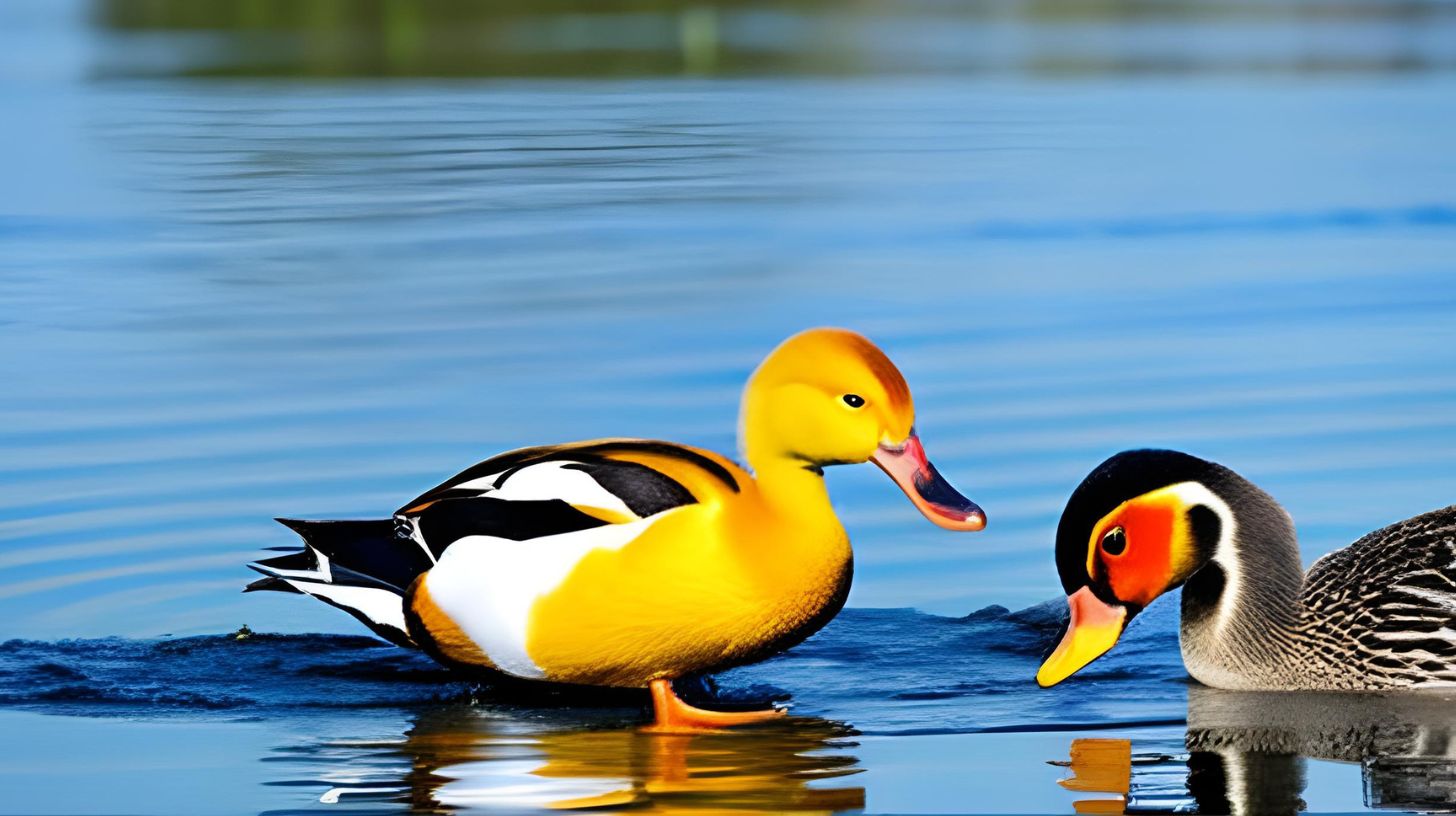Can Ducks Eat Honeydew Melon? A Guide to Feeding Ducks Fruits
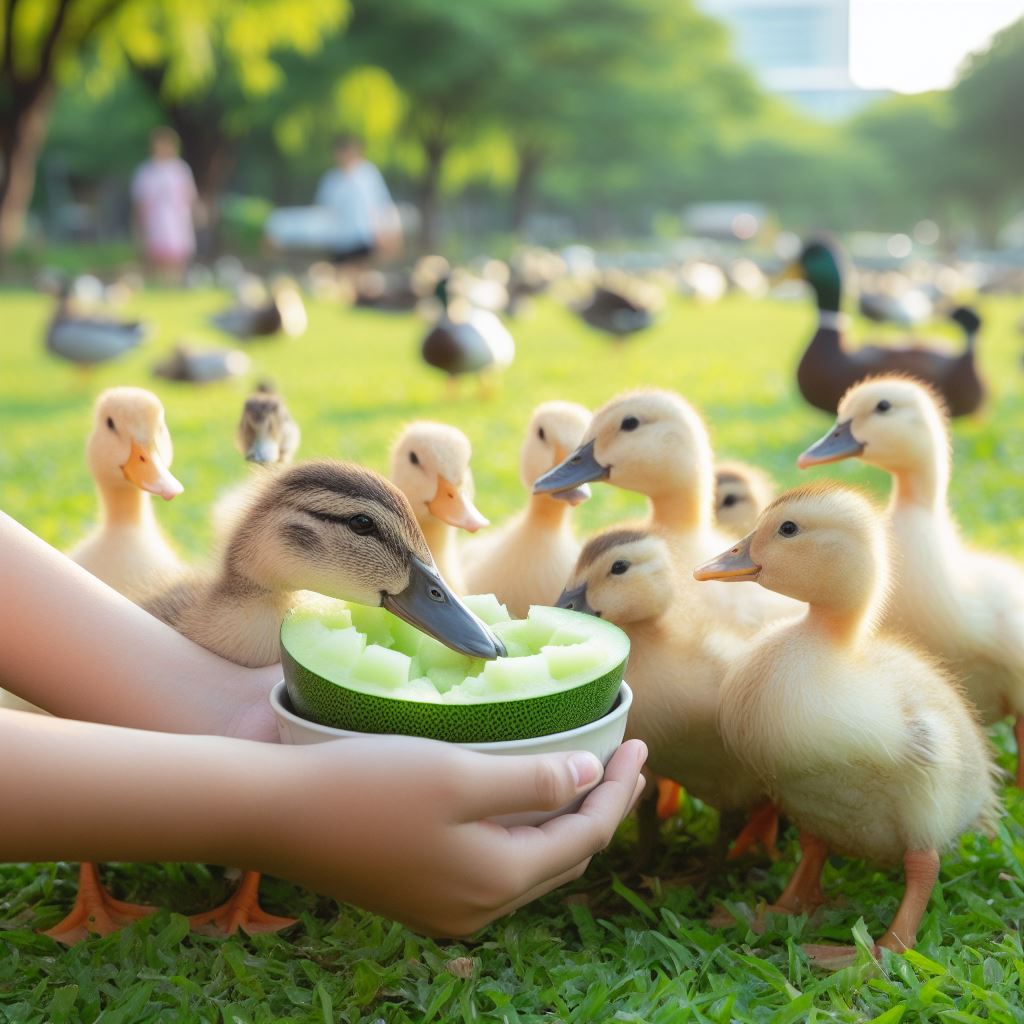
Table of content:
Honeydew melons are a sweet and refreshing treat for humans. But can ducks eat honeydew melon as well? And what other fruits and melons can ducks eat safely? This comprehensive guide takes a deep look at feeding ducks melons and fruit.
Key Takeaways:
- Honeydew melons are generally safe for ducks to eat in moderation. The seeds should be removed to prevent choking hazards.
- Cantaloupe, watermelon, grapes, and berries are also duck-safe fruits. Citrus fruits may be fed to ducks but can cause messy droppings.
- Avoid avocados, fruit pits/seeds, dried fruit, and fruits treated with pesticides. Monitor sugar intake.
- Feed fruits as occasional treats. Ducks require a balanced diet rich in protein, vitamins, and minerals.
- Wash all fruits and vegetables thoroughly before feeding ducks. Always provide fresh, clean water.
An Overview of Feeding Ducks Fruit
In the wild, ducks eat a varied diet of plants, seeds, insects, fish and other aquatic creatures. For domestic ducks and wild ducks being supplemented, fruits and melons can offer a beneficial treat in moderation.
Fruits provide vitamins, minerals, and hydration. They are naturally low in fat and contain antioxidants and phytonutrients. The natural sugars in fruit can also offer ducks an enjoyable source of carbohydrates and energy.
However, fruits do not provide the complete nutrition that ducks need. The bulk of a duck’s diet should still consist of duck feed pellets that are formulated with protein, vitamins, and minerals. Vegetables, insects, and other duck-safe foods should be mixed in for variety.
Fruits should comprise no more than 10-15% of a duck’s nutritional intake. Too much can lead to nutritional imbalance and diarrhea. Feed fruits in small quantities and watch to see if your ducks experience any digestive upset.
General Duck Fruit Safety Guidelines:
- Introduce new fruits slowly and one at a time.
- Chop large fruits into bite-sized pieces. Remove seeds, pits, and tough skins when necessary.
- Always wash fruits thoroughly to remove pesticide residues.
- Avoid dried fruit and fruits with added sugars. Stick to raw, fresh varieties.
- Monitor sugar consumption from fruit. Overfeeding can cause obesity and related health issues.
- Discontinue feeding if loose droppings or other signs of indigestion occur.
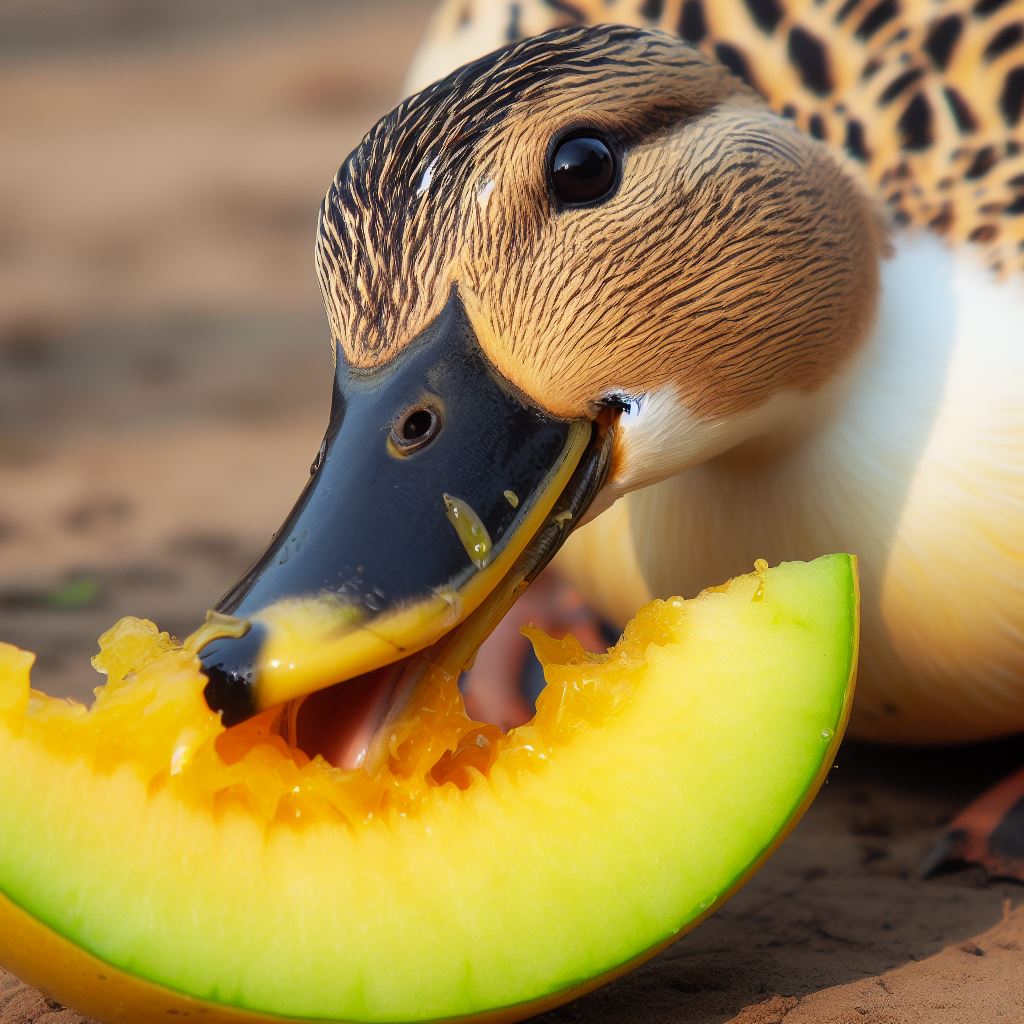 Are Honeydew Melons Safe for Ducks to Eat?
Are Honeydew Melons Safe for Ducks to Eat?
Honeydew melons are generally considered a duck-safe fruit as an occasional treat. Their sweet flavor and juicy flesh contain beneficial nutrients.
Honeydews are an excellent source of hydration due to their high water content. The melons also provide ducks with vitamin C, potassium, and antioxidants.
The flesh of ripe honeydew melons is soft enough for most ducks to digest easily. However, the seeds can pose a potential choking risk. For safety, seeds should always be removed before feeding melon to ducks.
To prepare honeydew melon for ducks:
- Wash the exterior of the melon thoroughly under running water to remove dirt and chemical residues.
- Slice the melon in half and scoop out the seeds. Discard the seeds.
- Dice the honeydew flesh into small, bite-sized cubes.
- Place a few melon cubes in a bowl and allow your ducks to enjoy this sweet treat! Monitor their consumption.
Honeydew, along with other melons, should only comprise a small part of your duck’s overall diet. Overfeeding can lead to nutritional imbalance. Ideally, melons should be fed no more than a few times per week.
Signs of overfeeding fruit include loose droppings, diarrhea, weight gain, decreased appetite for their normal food, and lethargy. If you observe these, discontinue melon treats until their digestive system normalizes.
Are Other Melons Safe for Ducks?
In addition to honeydew, other melons like cantaloupe and watermelon can also be fed to ducks in moderation.
Cantaloupe
Cantaloupe melons have a similar nutritional profile to honeydew. They are high in vitamin C and beta-carotene.
Cantaloupe flesh tends to be less firm than honeydew, so it’s even easier for ducks to digest. Just remember to scoop out and discard the seeds first.
Watermelon
Watermelons are also suitable for ducks. Their high water content helps ducks stay hydrated. Watermelons contain lycopene, an antioxidant that supports immune function.
When preparing watermelon, remove the thick rind and all seeds first. Watermelon rinds may be difficult for ducks to break down.
As with any melon, cantaloupe and watermelon should be fed sporadically in small amounts as a treat. Too much can disrupt balanced nutrition. Monitor duck droppings for any issues.
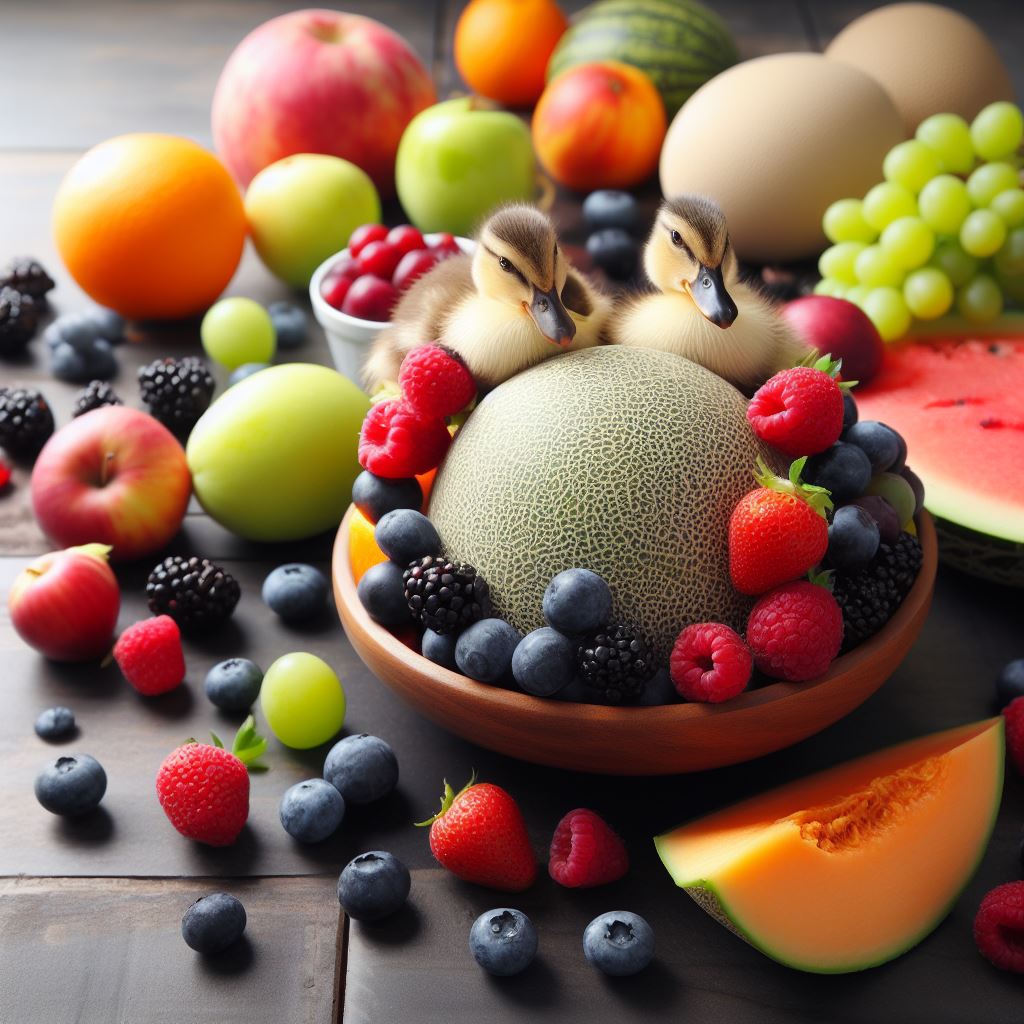 What Other Fruits Can Ducks Eat?
What Other Fruits Can Ducks Eat?
Aside from melons, ducks can safely enjoy a variety of fruits in moderation. Some other duck-safe fruits include:
Grapes
Grapes provide vitamin C, K, and antioxidants. Both red and green grapes are suitable for ducks. Grapes should be sliced in half or quartered to prevent choking.
Berries
Strawberries, blueberries, blackberries and raspberries offer great nutrition, including vitamin C and fiber. Softer berries like strawberries can be left whole. Cut firmer berries in half.
Bananas
Bananas are packed with potassium and vitamin B6. Peel and slice for easy eating. Too much banana can cause constipation, so feed in small amounts.
Apples
A duck favorite! Be sure to core apples and cut into manageable pieces before feeding. Remove seeds and stems, which can be a choking risk.
Pear
Pears offer vitamin C, copper, and fiber. Cut pears into slices or chunks and remove stem and seeds first.
Mango
Mangoes provide ducks with carotenoids for immune health. Peel and pit mangoes before chopping the flesh into bite-size portions.
Pineapple
Pineapple contains bromelain, an anti-inflammatory enzyme. The flesh can be a tasty treat for ducks. Be sure to remove the prickly skin first.
Orange
Oranges and other citrus fruits offer vitamin C. But acidic citrus fruits may cause runny droppings. Feed citrus in very small amounts.
Fruits Ducks Cannot Eat
While the fruits listed above are duck-safe, there are also many fruits that should not be fed to ducks.
Avoid Feeding Ducks:
- Avocados – The pit and skin contain the toxin persin, which is dangerous for ducks.
- Cherries, peaches, plums – Contain poisonous pits. Removing pits does not make these safe, as they still contain toxins.
- Rhubarb – The leaves are poisonous to ducks. Rhubarb stalks are also very fibrous and difficult to break down.
- Persimmons – Unripe persimmons contain toxins that can cause intestinal issues.
- Dried fruits – Dried fruits are super-concentrated in sugar and can easily cause diarrhea.
- Fruit with pesticides – The peel and skin tend to contain the most pesticide residues. Always thoroughly wash fruits and vegetables before feeding ducks!
In general, any fruit with a pit or seeds should not be fed to ducks whole. Even if you painstakingly remove all the pits, remnants of toxic compounds may remain in the flesh. Cherries, peaches, and plums are of particular concern, as they contain cyanide.
Tips for Safely Feeding Fruits to Ducks
When offering fruit treats:
- Always wash thoroughly under running water to remove dirt, chemicals, and bacteria.
- Remove all seeds, pits, stems, and tough peels when necessary. Cut into manageable pieces.
- Introduce new fruits slowly and one at a time to check for tolerance.
- Feed fruits in moderation – no more than 10-15% of total diet.
- Discontinue if loose droppings occur. Return to normal duck diet and try again later in smaller portions.
- Never leave uneaten fruit sitting out, as it can rot and attract pests. Promptly remove any leftover fruit.
- Ensure ducks have constant access to fresh, clean water to stay hydrated.
Fruits and melons like honeydew, cantaloupe, and watermelon can provide beneficial nutrients and hydration for ducks when enjoyed in moderation. For safety, remove all seeds and pits first and introduce new fruits slowly. Overfeeding fruit can disrupt nutritional balance. Stick to small portions as occasional treats. Pair with quality duck feed and diversified diet for optimal health.
Frequently Asked Questions
Can baby ducks eat fruit?
Baby ducklings have sensitive digestive systems. Wait until ducks are fully feathered and around 2-3 months old before introducing small samples of peeled, seeded fruit.
Do wild ducks eat fruit?
Wild ducks will sometimes supplement their normal diet with wild berries and other fruits. However, the bulk of their diet still consists of aquatic plants, seeds, and insects.
What are the best fruits to feed ducks?
Some of the best fruits for ducks include melons, berries, bananas, mangoes and chopped apples or pears. Orange and grapefruit can cause loose droppings.
How much fruit should ducks eat a day?
No more than 10-15% of a duck’s daily food intake should come from fruit. Feed fruit in moderation just 2-3 times per week. Overfeeding can lead to diarrhea.
Can too much fruit make ducks sick?
Yes, overfeeding fruit can definitely make ducks sick. Excess sugar and carbohydrates from fruit can disrupt digestion and nutrient absorption. Signs of overfeeding include loose stool, weight gain, lethargy, and reduced appetite for normal food.
Conclusion
Ducks can enjoy a variety of fruits, but only in moderation. Feed fruit as a supplemental treat 2-3 times per week, not as a dietary staple. Remove all seeds and pits first, introduce new items slowly, and monitor stool consistency.
Pair fruit with formulated duck feed, vegetables, and proteins for a balanced diet. With a little care, fruits like honeydew melon can be a safe, healthy, and appealing part of your duck’s varied menu!
Welcome. I’m Adreena Shanum, the proud owner of this website, and I am incredibly passionate about animals, especially poultry. I founded adreenapets.com as a labor of love, stemming from my desire to share my knowledge and experiences with poultry enthusiasts worldwide.


